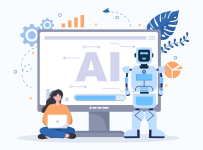As we stand on the brink of a new era, the future of education in 2050 is poised to be transformed by technological innovations and societal shifts. My involvement with ChildrenWhoCode has given me a glimpse into this transformative future. Let’s embark on a journey to explore how education will evolve, merging traditional learning with groundbreaking technologies to create a richer, more dynamic learning experience.
Immersive Learning: The Role of AR, VR, and AI
Imagine a classroom where the walls disappear, replaced by a virtual landscape that extends far beyond the physical space. Augmented Reality (AR) and Virtual Reality (VR) will revolutionize education by providing immersive learning environments that transport students to different times and places. Picture students walking through ancient Rome, witnessing historical events firsthand, or exploring the intricate details of the human body from the inside out. These immersive experiences will not only make learning more engaging but also deepen students’ understanding of complex subjects.
Artificial Intelligence (AI) will play a crucial role in this transformation. Advanced AI systems will analyze students’ learning habits and preferences, offering customized educational content that adapts to their unique needs. This personalized approach will ensure that every student receives instruction that is tailored to their learning style, maximizing their potential and enhancing their educational experience.
3D Printing: From Concept to Creation
In the future, every classroom will be equipped with 3D printers, turning imaginative ideas into tangible objects. Students will use these printers to create models and prototypes of their designs, bridging the gap between theoretical concepts and practical application. Whether it’s engineering a new type of bridge, designing a unique piece of art, or building a working model of a scientific principle, 3D printing will empower students to bring their ideas to life. This hands-on approach will foster creativity, problem-solving skills, and a deeper understanding of the material.
Moreover, the integration of 3D printing into the curriculum will encourage collaborative projects, where students work together to design and build solutions to real-world problems. This collaborative aspect will enhance teamwork and communication skills, preparing students for the demands of the modern workforce.
AI-Powered Cognitive Learning
Envision an educational system where AI serves as a personalized tutor, adapting to each student’s cognitive processes and learning needs. AI will analyze data from students’ interactions, identifying patterns and areas where they may need additional support. This real-time analysis will enable the AI to adjust the learning materials and strategies on the fly, ensuring that each student receives the appropriate level of challenge and assistance.
This adaptive learning environment will cater to diverse learning styles and abilities, providing a tailored educational experience that goes beyond a one-size-fits-all approach. By leveraging AI to support and enhance cognitive learning, educators will be able to address individual needs more effectively and promote a deeper understanding of the material.
Real-Time Feedback and Smart Automation
The future classroom will be characterized by instantaneous feedback, thanks to advanced AI systems that provide immediate insights into students’ performance. This real-time feedback will enable students to address their learning gaps promptly, making it easier to track progress and make improvements. Imagine students receiving instant corrections and suggestions during their assignments, allowing them to learn and grow continuously.
Additionally, smart attendance systems using biometric technology or facial recognition will streamline administrative tasks, reducing the time spent on mundane activities. This automation will free up educators to focus more on teaching and interacting with students, enhancing the overall educational experience.
Global Connectivity and Remote Learning
By 2050, universal internet access will be a fundamental right, breaking down the barriers to quality education for students around the globe. Remote learning will evolve from an alternative option to a mainstream educational pathway, providing equal access to educational resources regardless of geographic location. This global connectivity will ensure that every student has the opportunity to participate in high-quality education, bridging the digital divide and promoting educational equity.
Remote learning will also become increasingly sophisticated, with virtual classrooms and collaborative tools that enable students to engage with their peers and instructors from anywhere in the world. This interconnectedness will foster a global learning community, where students can share knowledge, collaborate on projects, and gain diverse perspectives.
Exploring the Metaverse for Education
Step into the Metaverse—a vast digital universe that will serve as a new frontier for education. In this expansive virtual space, students will have the freedom to explore and interact with a boundless array of educational experiences. From virtual field trips to simulated experiments, the Metaverse will provide a playground for experiential learning that transcends the limitations of traditional classrooms.
The Metaverse will also facilitate collaborative learning, allowing students from different regions and cultures to work together on projects and problem-solving activities. This virtual environment will promote global collaboration and enhance students’ ability to work effectively in diverse teams.
Augmented Reality in Literature
Imagine a literature class where stories leap off the pages and into the real world through Augmented Reality (AR). AR technology will bring characters, settings, and events to life, transforming reading from a passive activity into an interactive adventure. Students will be able to explore the worlds of their favorite books, interact with characters, and experience the narratives in new and engaging ways.
This immersive approach to literature will deepen students’ understanding of the material and make reading more enjoyable. By integrating AR into literature classes, educators will create dynamic and interactive learning experiences that capture students’ imaginations and foster a lifelong love of reading.
The Fusion of Technology and Learning
The classroom of 2050 will be a harmonious blend of technology and education, where advanced tools and innovative approaches enhance every aspect of the learning experience. From AI-driven personalized instruction to immersive VR experiences, technology will play a central role in shaping the future of education. This fusion of technology and learning will create a rich and engaging educational environment that inspires and motivates students to reach their full potential.
Shaping Tomorrow’s Education Today
As we approach this exciting future, it’s crucial for educators, technologists, and policymakers to actively contribute to the evolution of education. By embracing and implementing these technological advancements, we can help shape a future where learning is not only more effective but also more inclusive and engaging. What are your thoughts on the future of education? How do you envision these technological advancements transforming the learning experiences of tomorrow? Share your insights and join the conversation to help shape the educational experiences of the future.


